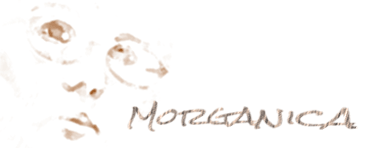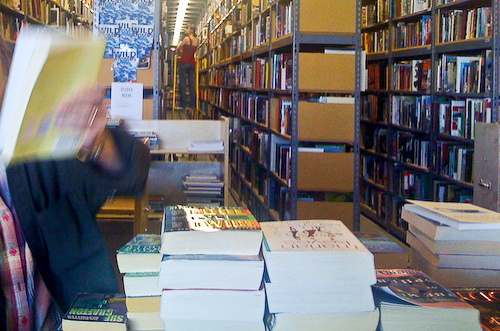Turning points, paradigm shifts, whatever you want to call them, there are maybe a dozen in my childhood and one was the night that Dad bought a huge box of books, at auction, for a quarter. That small thing started me on a writer’s journey.
I thought about it Friday as I stood in line to sell a few hundred books to Powells. I tried to decide if I had come back, full-circle, to Dad’s box of books or if I were simply committing literary murder.
Dad’s box had contained maybe 50 Readers Digest Condensed volumes, of 4-5 “books” each. It was a godsend; until we’d moved out of kidtravel distance, the local library had pretty much been my afterschool home–I had free run of the stacks and read everything. Now I was allowed to borrow only three “age-appropriate” books per weekly trip, which I usually demolished on the first night. Torture.
That box lasted all summer. It was a veritable survey of English and American literature for the last 200 years, and taught me more about writing and storytelling than any class. It laid the foundation for a skill that’s kept me in beans and mortgages since college. (Thanks, Dad)
Books were sacred in our house–you didn’t write on them, dogear them or (god forbid) throw them away. And here I was at the Powells warehouse, getting rid of about 300 of them. The rep was understanding (“abandonment issues,” she called it), but it still felt like murder.
For those of you who haven’t been lucky enough to visit Powells, it’s a big independent bookstore in Portland that sells new, used and rare books on just about any subject. If you’re a techie, you must visit their technical bookstore. Oh, and they also buy books.
I should probably explain: I read quite a bit, usually one or two books each day. The only reason I’m not ceiling-high in books is that I (a) love to reread several hundred favorites and (b) have a strict policy that incoming books must be matched by outgoing books.
In other cities, I’ve simply bundled up the extra books and taken them to charitable booksales every six months, happy in the knowledge that someone else will be reading them. Portland doesn’t appear to have charity booksales, unfortunately, and so grocery bagsfull have accumulated in my garage. The garage is currently being remodeled, and the books have to go. And that’s how I end up parked outside the Powells warehouse in north Portland.
Four bouts with a recalcitrant handtruck later, the books massed on the floor like huddled refugees. I stifled my guilt and asked the clerk if I should leave them to be sorted.
“Oh no, these are easy. It won’t take long,” and she began an examination of my personal reading life. It was mostly airport trash, what I call the light novels that I read on planes (New York to Seattle is a two-or three-book flight, Portland to the UK runs closer to seven). There were some outdated techbooks (which she mostly rejected), nonfiction that didn’t live up to its promise, books from authors I’ve grown out of, or don’t want to read again.
Nobody else wanted to read about 60 percent of my rejects, turns out. She rejected books they have too many of. Hardbound books already in paperback. Self-help books. “They’re popular for a few months, but they’re fads. Once they’re old, they won’t sell.”
There’s gotta be a lesson in there somewhere.
“You’ll want to keep these, they’re first editions,” she said reprovingly, and pushed back a stack of hardbound murder mysteries. “They’re not worth much now, but in 10, 15 years they will be.”
I asked her what Powells does with the rejects. “Not much,” she shrugged, “You can take them back, or we’ll recycle them for you,” pointing to colorful bins off to the side.
 I slowly absorbed the notion that I’m throwing books away for the first time in my life. It didn’t sit well. I pawed through her rejects and rebagged a lucky few to take home. But really, most of them I couldn’t use, and my bookshelves are full, so they stayed in the bins.
I slowly absorbed the notion that I’m throwing books away for the first time in my life. It didn’t sit well. I pawed through her rejects and rebagged a lucky few to take home. But really, most of them I couldn’t use, and my bookshelves are full, so they stayed in the bins.
“I’ll bet you have a lot of books at home,” I said, trying to make conversation and NOT look at the books in the bins, “since you have this job and all.”
“Oh yes,” she replied, “and a lot of it is books on books. You know, books that help me understand how to do this job. Of course, those books are just about worthless now.”
She grimaced, gesturing at her computer. “The Internet has made me totally replaceable. Who needs that kind of knowledge when all you have to do now is look it up online? They don’t really need me anymore–anybody can do this job. Who really cares about things like early colonial printing anymore?”
“I do,” I said. “It’s interesting stuff.”
“Then we’re both odd,” she laughed, and calculated the final worth of my papery orphans. “I can give you $80 in cash, or $105 in trade, in a bookstore gift certificate.”
“Trade,” I said instantly, and the deed was done.



It’s tough. I have a lot of books too. Definitely don’t read them as fast as you, but they are treasures and I do re-read my favorites.
When we moved 4+ years ago, I finally parted with some college text books and LOTS of others. Took them to the local library where some were salvaged, some were recycled. I just couldn’t bear the thought of throwing them out and thinking about them in some land fill not being ‘reborn’ in the recycling process somehow. At least some have been read by a new audience…or at least I hope they have been.
Guess moving/renovation generates the needed re-acquiring of space by cleaning out the old accumulations.
I sold a huge record collection a few years back due to space and non use issues. Many of my records were “over loved”, scratched, puppy chewed covers etc. I did save about 50 or so and will probably buy a USB turntable one day. The ones saved had very cool cover art or were favorites. A buddy was at one time the VP of sales for Warner Bros record and used to send me pallets of records plus posters. I did save a new, un-played set of Little Feat albums which in the old days were my favorite band. There was a time in the late 60’s early 70’s when I would get off work, cash my check and buy three albums for $11. One time a clerk at my favorite hole in the wall record store gave me a Jackson Brown, Saturate Before Using water bag which I proudly display in my shop.